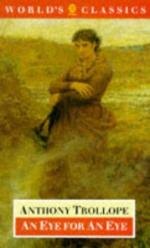his brain. Under the constant teaching of his
aunt he did recognize it as a fact that he owed a
high duty to his family. For many days after that
first night at Scroope not a word was said to him
about Kate O’Hara. He saw his uncle daily,—probably
twice a day; but the Earl never alluded to his Irish
love. Lady Scroope spoke constantly of the greatness
of the position which the heir was called upon to
fill and of all that was due to the honour of the
family. Fred, as he heard her, would shake his
head impatiently, but would acknowledge the truth
of what she said. He was induced even to repeat
the promise which he had made to his uncle, and to
assure his aunt that he would do nothing to mar or
lessen the dignity of the name of Neville. He
did become, within his own mind, indoctrinated with
the idea that he would injure the position of the
earldom which was to be his were he to marry Kate O’Hara.
Arguments which had appeared to him to be absurd when
treated with ridicule by Father Marty, and which in
regard to his own conduct he bad determined to treat
as old women’s tales, seemed to him at Scroope
to be true and binding. The atmosphere of the
place, the companionship of Miss Mellerby, the reverence
with which he himself was treated by the domestics,
the signs of high nobility which surrounded him on
all sides, had their effect upon him. Noblesse
oblige. He felt that it was so. Then there
crossed his brain visions of a future life which were
injurious to the girl he loved.
Let his brother Jack come and live at Scroope and
marry Sophie Mellerby. As long as he lived Jack
could not be the Earl, but in regard to money he would
willingly make such arrangements as would enable his
brother to maintain the dignity and state of the house.
They would divide the income. And then he would
so arrange his matters with Kate O’Hara that
his brother’s son should be heir to the Earldom.
He had some glimmering of an idea that as Kate was
a Roman Catholic a marriage ceremony might be contrived
of which this would become the necessary result.
There should be no deceit. Kate should know it
all, and everything should be done to make her happy.
He would live abroad, and would not call himself by
his title. They would be Mr. and Mrs. Neville.
As to the property, that must of course hereafter
go with the title, but in giving up so much to his
brother, he could of course arrange as to the provision
necessary for any children of his own. No doubt
his Kate would like to be the Countess Scroope,—would
prefer that a future son of her own should be the
future Earl. But as he was ready to abandon so
much, surely she would be ready to abandon something.
He must explain to her,—and to her mother,—that
under no other circumstances could he marry her.
He must tell her of pledges made to his uncle before
he knew her, of the duty which he owed to his family,
and of his own great dislike to the kind of life which
would await him as acting head of the family.




